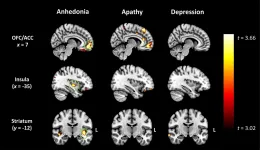(Press-News.org) Philadelphia, April 12, 2021 - Electronic cigarette (EC) use, or vaping, has both gained incredible popularity and generated tremendous controversy, but although they may be less harmful than tobacco cigarettes (TCs), they have major potential risks that may be underestimated by health authorities, the public, and medical professionals. Two cardiovascular specialists review the latest scientific studies on the cardiovascular effects of cigarette smoking versus ECs in the Canadian Journal of Cardiology, published by Elsevier. They conclude that young non-smokers should be discouraged from vaping, flavors targeted towards adolescents should be banned, and laws and regulations restricting their availability to our youth should be passed and strictly enforced.
Arash Nayeri, MD, and Holly Middlekauff, MD, of the David Geffen School of Medicine at UCLA, Department of Medicine, Division of Cardiology, Los Angeles, CA, USA, have written this review to provide physicians with an objective, rather than emotional, assessment of the available scientific data about ECs so that these physicians can help their patients make informed and thoughtful decisions.
TCs are lethal, killing up to half the people who use them. They are a leading cause of preventable cardiovascular morbidity and mortality around the globe, projected to account for an estimated eight million deaths annually worldwide by 2030, most of which resulting from cardiovascular disease.
ECs have gained popularity since 2007, both among long-term TC smokers and youth who have never smoked tobacco. There is evidence that ECs are less harmful than TCs, and the absence of a number of known toxic byproducts of TCs has helped cultivate the perception that ECs are healthy (or at least benign).
A recent review of more than 50 scientific studies involving over 12,000 participants concluded that ECs are more effective for smoking cessation than certified nicotine replacement therapy (NRT) like patches or gum and were also more effective than behavioral support alone, thereby providing a potential alternative to lethal cigarettes for adult smokers addicted to nicotine. However, there is growing concern that some of their constituents, including nicotine, and their thermal degradation byproducts, may have adverse effects.
"EC vaping by our youth has become so popular that it is approaching a public health crisis," explain the authors. "Fast on its heels is the recent rapid rise in vaping marijuana. In fact, more youth use marijuana, including vaping it, than currently smoke cigarettes. We have got to get this under control, and the first step in doing so is to know the facts."
Dr. Nayeri and Dr. Middlekauff evaluate:
Evolution in devices and nicotine delivery of ECs
Cardiovascular effects of nicotine
Non-nicotine constituents and byproducts and biomarkers of cardiovascular risk
Effects of ECs on hemodynamics, arrhythmogenicity, oxidative stress and Inflammation, thrombogenesis, and vascular health
ECs as effective tools to reduce tobacco smoking
Public health implications of tobacco smoking versus vaping
Emergence of pod-like devices
EVALI (EC, or vaping, product use associated lung injury)
It has been calculated that 1.6 to 6.6 million American lives could be saved over 10 years by switching from TCs to ECs. However, the authors point out that the long-term risks of ECs are still unknown and recommend use for the shortest effective time. They also note that fourth generation devices, "pods," can deliver similar amounts of nicotine as combustible cigarettes by employing "nicotine salts." Each pod may contain a nicotine load equivalent to a pack of cigarettes, and thus may pose a greater risk of addiction to non-smokers than earlier generation devices. On the other hand, these pod-like devices replicate the nicotine delivery of combustible cigarettes, and thus may have more appeal to smokers addicted to nicotine who want to quit tobacco cigarettes.
The authors point out that smoking one to three cigarettes a day has almost the same cardiovascular risk as smoking one to three packs per day, so using ECs to cut down on smoking (rather than eliminate it) is not an effective strategy. Therefore, they recommend that TC smokers who want to quit and who have failed certified, conventional therapies may consider ECs, but should use them to replace TCs completely.
"Only with great caution and after exhausting all other smoking cessation strategies should we consider recommending that our TC smoking patients switch to ECs," comments Dr. Nayeri. "Switching to unregulated ECs, with all their promise as smoking cessation devices, may lead to unforeseen, potentially fatal consequences. As currently marketed without quality control, ECs are no panacea," caution the authors.
Since ECs are not harmless, non-smokers, especially adolescents and young adults, should not use them, say the authors. "The direct marketing to young never smokers and the development of thousands of dessert and candy flavored liquids have unconscionably attracted millions of children to try them," notes Dr. Middlekauff. To discourage young non-smokers from vaping, the authors propose that flavors should be banned, public health anti-vaping campaigns should be supported, and laws and regulations restricting their availability to young people should be passed and strictly enforced. They also strongly recommend that people should stay away from bootlegged or black-market nicotine- or marijuana-based EC products.
"Look before you leap," writes Andrew L. Pipe, CM, MD, Division of Cardiac Prevention and Rehabilitation, University of Ottawa Heart Institute, Ottawa, ON, Canada, in an accompanying editorial.
Dr. Pipe points out that despite limited evidence to support the use of electronic nicotine delivery systems (ENDS) for smoking cessation in recent clinical studies, evidence of successful cessation in "real world" settings is not apparent. "Nonetheless, the use of ENDS containing known quantities of nicotine and limited flavoring might facilitate their use for smoking cessation, however, in the absence of appropriate product regulation such clinical use is unlikely in the near future."
Commenting on the policy vacuum in Canada that allowed the virtually unregulated entry of ENDS into Canada in contrast to the situation in other jurisdictions, Dr. Pipe notes the government's lack of consideration of their attractiveness to youth and limited regulation of their content, marketing and merchandising, contributing factors to widespread use and abuse of ENDS in Canada. Outcries from parents, educators, clinicians, and health organizations like the Heart and Stroke Foundation of Canada are now resulting in regulatory proposals.
"Will we be replacing the burden of lung- and other smoking-related cancers with an unanticipated burden of differing forms of chronic, incapacitating respiratory disease in years to come?" concludes Dr. Pipe. "Many who anticipated the arrival of ENDS with an optimistic curiosity now recognize the unfortunate realities that have surrounded their largely unregulated arrival. Perhaps some leapt - before they looked."
INFORMATION:
What exactly happens when the corona virus SARS-CoV-2 infects a cell? In an article published in Nature, a team from the Technical University of Munich (TUM) and the Max Planck Institute of Biochemistry paints a comprehensive picture of the viral infection process. For the first time, the interaction between the coronavirus and a cell is documented at five distinct proteomics levels during viral infection. This knowledge will help to gain a better understanding of the virus and find potential starting points for therapies.
When a virus enters a cell, viral and cellular protein molecules begin to interact. Both the replication of the virus and the reaction of ...
PHILADELPHIA - Residents in majority-Black neighborhoods experience higher rates of severe pregnancy-related health problems than those living in predominantly-white areas, according to a new study of pregnancies at a Philadelphia-based health system, which was led by researchers in the Perelman School of Medicine at the University of Pennsylvania. The findings, published today in Obstetrics and Gynecology, suggest that neighborhood-level public health interventions may be necessary in order to lower the rates of severe maternal morbidity -- such as a heart attack, heart failure, eclampsia, or hysterectomy -- and mortality ...
April 12, 2021 - For critically ill COVID-19 patients treated with extracorporeal membrane oxygenation (ECMO), the risk of death remains high - but is much lower than suggested by initial studies, according to a report published today by Annals of Surgery. The journal is published in the Lippincott portfolio by Wolters Kluwer.
The findings support the use of ECMO as "salvage therapy" for COVID-19 patients with acute respiratory distress syndrome (ARDS) or respiratory failure who do not improve with conventional mechanical ventilatory support, according to the new research by Ninh T. Nguyen, MD, Chair of the Department of Surgery, University ...
New research by Yale Cancer Center shows patients with early-onset colorectal cancer, age 50 and younger, have a better survival rate than patients diagnosed with the disease later in life. The study was presented virtually today at the American Association of Cancer Research (AACR) annual meeting.
"Although small, we were surprised by our findings," said En Cheng, MD, MSPH, lead author of the study from Yale Cancer Center. "Past studies have shown younger colorectal patients, those under 50, were reported to experience worse survival compared with patients diagnosed at older ages. We hope this result can be inspiring for these ...
In a new study led by Yale Cancer Center, researchers have advanced a tumor-targeting and cell penetrating antibody that can deliver payloads to stimulate an immune response to help treat melanoma. The study was presented today at the American Association of Cancer Research (AACR) virtual annual meeting.
"Most approaches rely on direct injection into tumors of ribonucleic acids (RNAs) or other molecules to boost the immune response, but this is not practical in the clinic, especially for patients with advanced cancer," said Peter M. Glazer, MD, PhD, Chair of the Department of Therapeutic Radiology ...
New research from CU Cancer Center member Scott Cramer, PhD, and his colleagues could help in the treatment of men with certain aggressive types of prostate cancer.
Published this week in the journal Molecular Cancer Research, Cramer's study specifically looks at how the loss of two specific prostate tumor-suppressing genes -- MAP3K7 and CHD1 --increases androgen receptor signaling and makes the patient more resistant to the anti-androgen therapy that is typically administered to reduce testosterone levels in prostate cancer patients.
"Doctors don't normally stratify patients based on this subtype and say, 'We're going to have to treat these people differently,' but we think this should be considered before treating ...
KEY POINTS:
- Loss of pleasure has been revealed as a key feature in early-onset dementia (FTD), in contrast to Alzheimer's disease.
- Scans showed grey matter deterioration in the so-called pleasure system of the brain.
- These regions were distinct from those implicated in depression or apathy - suggesting a possible treatment target.
People with early-onset dementia are often mistaken for having depression and now Australian research has discovered the cause: a profound loss of ability to experience pleasure - for example a delicious meal or beautiful sunset - related to degeneration of 'hedonic hotspots' in the brain where pleasure mechanisms are concentrated.
The University of Sydney-led ...
While the new Coronavirus will, hopefully, be effectively controlled sooner rather than later, its latest namesake is here to stay - a small caddisfly endemic to a national park in Kosovo that is new to science.
Potamophylax coronavirus was collected near a stream in the Bjeshkët e Nemuna National Park in Kosovo by a team of scientists, led by Professor Halil Ibrahimi of the University of Prishtina. After molecular and morphological analyses, it was described as a caddisfly species, new to science in the open-access, peer-reviewed Biodiversity Data Journal.
Ironically, the study of this new insect was impacted by the same pandemic that inspired its scientific name. Although it was collected a few years ago, the new species was only described during the global pandemic, ...
New research shows that people who experience big dips in blood sugar levels, several hours after eating, end up feeling hungrier and consuming hundreds more calories during the day than others.
A study published today in Nature Metabolism, from PREDICT, the largest ongoing nutritional research program in the world that looks at responses to food in real life settings, the research team from King's College London and health science company ZOE (including scientists from Harvard Medical School, Harvard T.H. Chan School of Public Health, Massachusetts General Hospital, the University of Nottingham, Leeds University, and Lund University ...
Between 2018 and 2020, 1,4 million EU citizens signed the petition 'End the Cage Age', with the aim of ending cage housing for farm animals in Europe. In response to this citizens initiative, the European Parliament requested a study by Utrecht University researchers on the possibilities to end cage housing. On 13 April, the scientists will present their report 'End the Cage Age - Looking for Alternatives' to the European Parliament.
In the report, behavioural biologists, animal scientists, veterinarians and ethicists from Utrecht University's Faculty of Veterinary Medicine analysed the available scientific literature on alternatives to cage housing. "Our focus was on laying hens and pigs" says Bas Rodenburg, Professor of Animal Welfare at Utrecht University. "Because these ...




